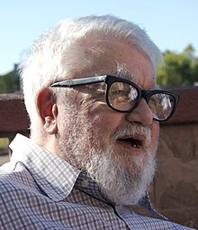| On This Day in 1927 Creator of LISP Born |
| Written by Historian |
| Saturday, 04 September 2021 |
|
John McCarthy, the man who invented the LISP programming language was born on September 4, 1927 in Boston Massachusetts. He is also remembered as the organizer of the summer workshop at Dartmouth College that is considered to be the founding event of Artificial Intelligence as a field.
John McCarthy The first use of the term "Artificial Intelligence" came in the proposal for a two-month, ten-man workshop to be carried out at Dartmouth College in 1956. This event, organized by John McCarthy, who was then an Assistant Professor at Dartmouth College went ahead, with Marvin Minsky, Claude Shannon, Nathaniel Rochester, Arthur Samuel, Allen Newell, Herbert Simon, Trenchard More, Ray Solomonoff and Oliver Selfridge, and is considered as "the birth" of AI. Motivated by his: "desire for an algebraic list processing language for artificial intelligence work", McCarthy went to create LISP which was released in 1960. Based on the lambda calculus, it soon became the programming language of choice for AI applications. His own papers on the History of LISP, are available on the Stanford University website and are accessible via his Home Page. McCarthy was part of the Stanford faculty for almost four decades. He initially moved there in 1953 from Princeton where he had done his PhD. In 1962 he helped found the Stanford Artificial Intelligence Laboratory (SAIL). He was appointed Professor Emeritus of Computer Science at Stanford in 2001 and continued to be interested in its artificial intelligence research even though he might disagree with the direction it was going in. According to Daphne Koller, who was a professor at SAIL in 2011 when McCarthy died: "He believed in artificial intelligence in terms of building an artifact that could actually replicate human level intelligence, and because of this, we was very unhappy with a lot AI today, which provides some very useful applications but focuses on machine learning." While his legacy includes many things, including inventing garbage collection, it is LISP that arguably is best known among programmers and among AI students and practitioners. Students, in particular, have long thought of the deeply nested brackets so characteristic of LISP as being some sort of torture by parentheses. Today, LISP is still highly regarded as a programming language and has influenced many modern languages such as JavaScript and Clojure. Even though the initial reaction to LISP is often horror, most programmers find it addictive once they get beyond the initial experience. It is an example of a language that has few rules and few facilities but once you understand it seems powerful and extensible. LISP makes you understand that you can do a lot with very little. The classic xkcd cartoon summarizes this perfectly:
As one of the first computer languages, LISP is now over 60 years old, just one year younger than FORTRAN, but it is still a force in the way we think about programming. John McCarthy in 2006 More InformationJohn McCarthy entry in Wikipedia Related ArticlesTowards Objects and Functions - Computer Languages In The 1980s A Brief History Of Programming Languages To be informed about new articles on I Programmer, sign up for our weekly newsletter, subscribe to the RSS feed and follow us on Twitter, Facebook or Linkedin.
Comments
or email your comment to: comments@i-programmer.info |
| Last Updated ( Saturday, 04 September 2021 ) |





